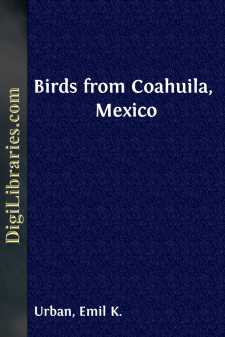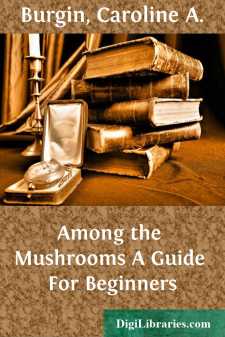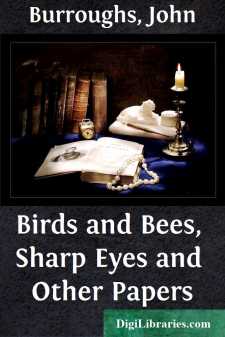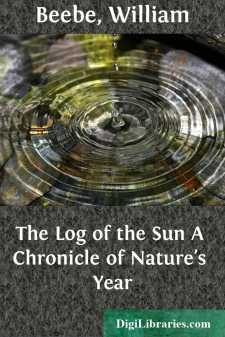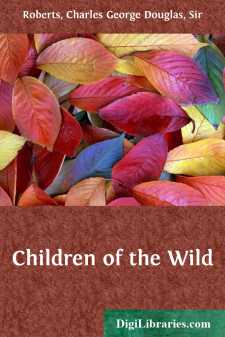Nature
Nature Books
Sort by:
Our aim is to bring up to date the list of kinds of bats actually known from Barro Colorado Island, Panamá. In 1952 Samuel T. Dickenson, Marguerite Schultz, George P. Young, and E. Raymond Hall spent the first 17 days of April (except Mrs. Schultz who left on April 8) on Barro Colorado Island. On eight evenings a silk net, 30 feet long and 7 feet high with a ¾-inch mesh, was stretched in an open...
more...
by:
Carl Lumholtz
PREFACE Ever since my camping life with the aborigines of Queensland, many years ago, it has been my desire to explore New Guinea, the promised land of all who are fond of nature and ambitious to discover fresh secrets. In furtherance of this purpose their Majesties, the King and Queen of Norway, the Norwegian Geographical Society, the Royal Geographical Society of London, and Koninklijk Nederlandsch...
more...
The Freedom of the Black-faced Ram n the top of Ringwaak Hill the black-faced ram stood motionless, looking off with mild, yellow eyes across the wooded level, across the scattered farmsteads of the settlement, and across the bright, retreating spirals of the distant river, to that streak of scarlet light on the horizon which indicated the beginning of sunrise. A few paces below him, half-hidden by a...
more...
by:
Emil K. Urban
DISTRIBUTION OF THE KNOWN BREEDING BIRDS OF COAHUILA Topography and Climate Coahuila lies in the broad northern end of México, immediately east of the center of the continental mass. The mountains of Coahuila, which are part of the Rocky Mountain-Sierra Madre Oriental Axis, extend in a north-south direction and divide the lower lands into two areas, a larger one, a part of the Central Plateau, to the...
more...
INTRODUCTION. This book is intended for those who, though ignorant on the subject, desire to know something about mushrooms. The first question which such an one asks upon finding a mushroom is, “What is its name?” If there is no one near to tell him, then follows the second inquiry, “How can I find it out for myself?” If wild flowers were concerned, Gray’s little book, “How the Plants...
more...
by:
John Burroughs
BIOGRAPHICAL SKETCH.Nature chose the spring of the year for the time of John Burroughs's birth. A little before the day when the wake-robin shows itself, that the observer might be on hand for the sight, he was born in Roxbury, Delaware County, New York, on the western borders of the Catskill Mountains; the precise date was April 3, 1837. Until 1863 he remained in the country about his native...
more...
INTRODUCTION Does the fact that a weak mortal sought an unprofaned sanctuary—an island removed from the haunts of men—and there dwelt in tranquillity, happiness and security, represent any just occasion for the relation of his experiences—experiences necessarily out of the common? To this proposition it will be for these pages to find answer. Few men of their own free will seek seclusion, for...
more...
by:
William Beebe
BIRDS OF THE SNOW No fact of natural history is more interesting, or more significant of the poetry of evolution, than the distribution of birds over the entire surface of the world. They have overcome countless obstacles, and adapted themselves to all conditions. The last faltering glance which the Arctic explorer sends toward his coveted goal, ere he admits defeat, shows flocks of snow buntings...
more...
by:
George Waring
CHAPTER I. "Bless me, I do believe I have been asleep!" said a squirrel, one fine morning in early spring, when the delicious warmth of the sun had reached him in his winter retreat, and roused the lazy little fellow from a two months' nap. The truth is, that he and his family had fallen asleep at the first setting in of the cold weather, and had passed the dismal winter in a state of...
more...
CHAPTER I THE LITTLE FURRY ONES THAT SLIDE DOWN HILL In the brown, balsam-smelling log cabin on the shores of Silverwater, loveliest and loneliest of wilderness lakes, the Babe's great thirst for information seemed in a fair way to be satisfied. Young as he was, and city-born, the lure of the wild had nevertheless already caught him, and the information that he thirsted for so insatiably was all...
more...





